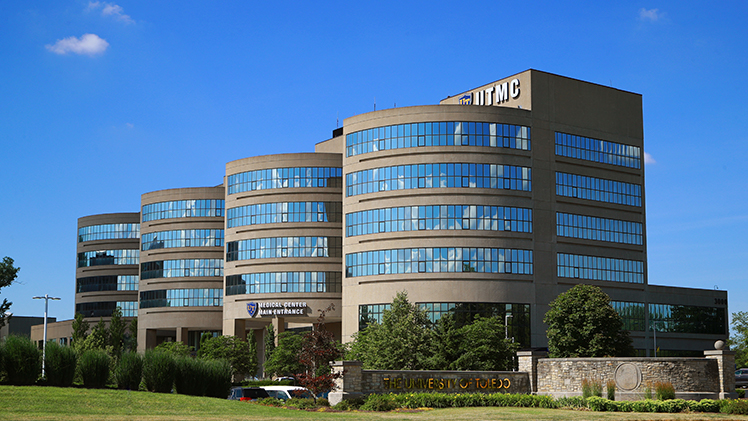The University of Toledo Medical Center has been recognized by the American College of Cardiology with a Gold Performance Achievement Award for its high-quality, comprehensive care of heart attacks.
UTMC is one of 60 hospitals nationwide and the only hospital in metro Toledo to receive the honor.

UTMC is the only hospital in metro Toledo to receive a Gold Performance Achievement Award by the American College of Cardiology for its high-quality, comprehensive care of heart attacks.
“This distinction reinforces UTMC’s position as a leader in the treatment of serious heart attacks and further illustrates the high quality of care we deliver to our Toledo community,” said Dr. Michael Ellis, UTMC chief medical officer. “We’re proud to be recognized among the best of the best in cardiac care.”
The annual Chest Pain – MI Registry Performance Achievement Awards are presented to hospitals that exemplify an aggressive commitment to treating all heart attack patients with the highest standard of care, based on guidelines and recommendations set by the American College of Cardiology and the American Heart Association.
“As a Gold Performance Award recipient, The University of Toledo Medical Center has established itself as a leader in setting the national standard for improving quality of care in patients with acute myocardial infarction,” said Dr. Michael C. Kontos, chair of the NCDR Chest Pain – MI Registry steering subcommittee and a cardiologist at Virginia Commonwealth University Medical Center. “By meeting the award requirements set forth in the registry, UTMC has demonstrated a commitment to providing reliable, comprehensive treatment for heart attack patients based on current clinical guideline recommendations.”
UTMC has received the American College of Cardiology’s gold award in each of the last three years.
“UTMC has demonstrated that we consistently treat heart attack patients according to the most current evidence-based guidelines and strive to improve the quality, safety and outcomes of care provided for patients with coronary artery disease — specifically high-risk heart attack patients,” said Dr. Ehab Eltahawy, a UTMC cardiologist and director of the UTMC Cardiovascular Laboratory. “This commitment begins the moment they come in our door and continues through their hospital stay and discharge.”
A heart attack occurs when a blood clot partially or completely blocks one of the heart’s coronary arteries, starving the heart muscle of oxygen. More than 800,000 Americans suffer a heart attack every year.
When a heart attack patient arrives at the emergency room, healthcare professionals race to restore blood flow to the heart muscle. For the most serious type of heart attack, known as STEMI, patients frequently require a balloon angioplasty to reopen a completely blocked artery.
“This procedure is most effective within the 90-minute time frame before permanent damage to the heart has occurred,” Eltahawy said. “In clinical practice, shortening the door-to-balloon time was significantly associated with increased survival.”
UTMC targets a door-to-balloon time of less than 60 minutes and has achieved the American Heart Association’s 90-minute benchmark in 100% of its cases over the past several years. The hospital has 24-hour coverage with an on-call cath team 365 days a year.
Other performance measures considered as part of the American College of Cardiology award process include providing appropriate medicines at the time of presentation, during the hospital stay and at the time of discharge; evaluating a patient’s heart pumping function during their stay; and referring them to a cardiac rehabilitation program at discharge.